The views expressed in our content reflect individual perspectives and do not represent the authoritative views of the Baha'i Faith.
I work at the University of KwaZulu-Natal, one of South Africa’s largest universities. Like all higher education institutions created before 1994, it has a history immersed in racial segregation.
The current form of the university was welded in 2004 out of two previously separate and unrelated educational institutions: The University of Natal, originally designated for white students; and the University of Durban-Westville, where Indian students attended.
The University of Natal was established in 1910, nearly 40 years before the establishment of the apartheid government. Durban-Westville was established in the 1960s in the middle years of apartheid. In 1949, the University of Natal established a separate medical school for black students.
As you read about this institutionalized segregation, you may feel the bile churning. But this was South Africa’s historical reality – and sadly, in many ways it remains its reality.
For although these former race-based institutions are now integrated as one – and the racial demographics of the university have begun to reflect the racial demographics of the nation – race, ethnicity, and nationality still remain a central focus of leadership. That leadership has a dogged determination to force the university’s demographics to represent the nation’s demographics – with little understanding of the concepts of building unity or the foundation upon which it is built. All this has unwittingly led to the self-same divisions that drove the reintegration of the nation and its institutions some two decades ago.
The Baha’i teachings are very clear about this dynamic:
The well-being of mankind, its peace and security, are unattainable unless and until its unity is firmly established. This unity can never be achieved so long as the counsels which the Pen of the Most High hath revealed are suffered to pass unheeded. – Baha’u’llah, Gleanings from the Writings of Baha’u’llah, p. 286.
Baha’u’llah’s most fundamental counsel is the oneness of humankind – from there flow all possibilities:
The Prophets of God should be regarded as physicians whose task is to foster the well-being of the world and its peoples, that, through the spirit of oneness, they may heal the sickness of a divided humanity. – Ibid., p. 79.
Ironically, however, it is not really race, ethnicity and nationality per se that divides us. In South Africa, “separateness” (the literal translation of apartheid) is our social and cultural norm. We want to be one, but we have been conditioned to be separate. We learn the words of unity and oneness: “simunye” in Zulu means “we are one,” and “ubuntu” expresses the understanding that we are all one human family. But we are indoctrinated into the practice of and preference for separation, heedless of the true meaning of these words.
We have a constitution that guarantees our equality. But it also entrenches the desire to maintain our differentness. My difference from you defines me. My difference from you gives me my identity. My difference from you makes me greater or lesser than you. Difference is essential. While the intent is unity in diversity, the practice is often diversity before unity. We have lost our understanding that our true identity is that of one human family, and instead have turned to superficial distinctions of color and class to lend us that false comfort of belonging. We seem unaware that we have deprived ourselves of a true sense of belonging.
Ours is a society, like many others in the world, with deeply embedded attachment to separation. It exists between races and it exists within races. It exists between genders and within genders. It exists between ages and within ages. We live in a society of us and them – all anyone has to do is look at the height of walls around houses and the prevalence of security measures, from razor wire to gated communities to armed response services, or at the extremes between the rich and poor (one of the most disproportionate in the world), or at the many mechanisms that exist to reinforce or even foster our separation.
Knowing that we are meant to be one, our response is to create outward semblances of unity. We wear t-shirts emblazoning Mandela’s visage, but inwardly curse the government he created for failing “us.” Rarely do we look inward to ourselves and ask the more penetrating questions: How do I really view those around me? When I look at you, what do I see? Who do I see? Even less so to ask: “How am I responsible? How can I help?”
Baha’u’llah wrote:
The essence of all that We have revealed for thee is Justice, is for man to free himself from idle fancy and imitation, discern with the eye of oneness His glorious handiwork, and look into all things with a searching eye. – Tablets of Baha’u’llah, p. 157.
The Baha’i teachings also tell us that, when we look at one another with genuine love and with a “searching eye” and the “eye of oneness,” we will “see the Divine Love reflected in the heart” and that “Each sees in the other the Beauty of God reflected in the soul.” – Abdu’l-Baha, Paris Talks, pp. 180-181.
The result: in “finding this point of similarity, [we] are attracted to one another in love …” creating “the foundation of real unity.” – Ibid.
But because religion, true religion, has been supplanted by words not followed by deeds, and by memes and slogans and cherry-picked verses, so often when we look at one another we see anything but reflections of Divine Love of the Beauty of God. We are so intent on seeing our differences that we have all but neglected the essential purpose of religion from the dawn of time: to draw all humanity closer to its Creator, and in doing so, closer to one another in unity. The moral demands of religion have been relegated as outmoded and not in keeping with the modern age — and then superseded by divisive ideologies which are raised often in the name of God.
How then, can unity be fostered in such an environment? Honestly, it can be established exactly as Baha’u’llah said it could be established. Bearing witness to this fundamental failure to create unity in South Africa has permitted me to better understand what is needed.
Unity requires two things – two small changes in my – and, if you are willing, your – behavior.
First: I must deliberately look for (and see) the Divine Love reflected in the hearts of all those I encounter. I must deliberately look for (and see) the Beauty of God reflected in the soul of all those who cross my path – whatever the circumstances.
Second: to apply (as creatively as possible) the sentiment embedded in these words of Abdu’l-Baha: “So far as ye are able, ignite a candle of love in every meeting, and with tenderness rejoice and cheer ye every heart.” – Selections from the Writings of Abdu’l-Baha, p. 34.
The first step changes the way I perceive and interact with the people around me. The second step gives me a challenge for action – to actually express loving words and carry out loving actions.
I want to tell you that it is possible to build unity in this way – I have seen it with my own eyes within the very divided institution where I work. It may not be a perfect or complete unity, but it creates definite progress in that direction. Meetings in my section of the university that were previously characterized by mutual distrust and exerting one’s power over others now focus on the work at hand, are conducted with greater courtesy, seek truth (even if it means sacrificing personal opinion), and are no longer avoided or seen as useless but “necessary” evils.
Two things have really happened in these meetings: (1) everyone is treated as important and valued, irrespective of rank or position within the university, and is given an equal voice and vote. Even the minute-takers now contribute to the consultation; and (2) I bake biscuits for every meeting I attend. The first represents the practical application of seeing the love and beauty of God in one another. The second implements a simple way to act as a candle of love.
While this level of budding unity has not yet reached senior management who, like so many people in positions of authority, still subscribe to more traditional means of enforcing order, what has been surprising is the way this approach has now spread to other parts of the university.
What this has taught me is that one does not have to recognize or even know the source of the Baha’i teachings. A humble effort to apply them in very ordinary circumstances is all they require to implant and sustain, like a tree growing from the side of a granite mountain, new levels of unity.
This is something each of us can do – “so far as ye are able.”


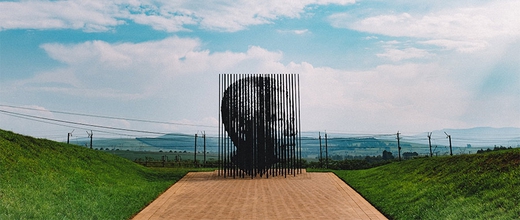



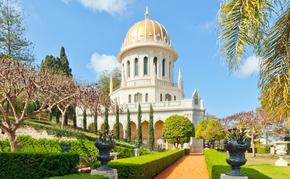

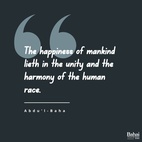
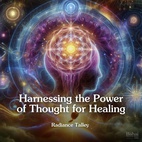
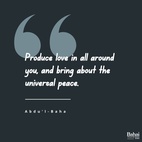
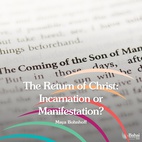
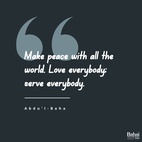




Comments
Sign in or create an account
Continue with Facebookor